Construction arbitration plays a crucial role in resolving disputes within the dynamic construction industry. As projects become more complex, arbitration offers a swift and efficient means to address conflicts while maintaining project momentum. The construction industry has undergone significant growth and changes in trends and practices, leading to various disputes emerging from this sector.
Recent cases have significantly impacted the landscape of construction arbitration. The Delhi High Court's ruling in Union of India v. M. V. Omni Projects (India) Ltd. emphasizes the importance of valid arbitrator appointments, while the Allahabad High Court's decision in State of U.P. v. Nath Construction clarifies the grounds for setting aside arbitration awards. These cases provide valuable insights into key aspects of construction arbitration, including procedural issues and the role of courts in navigating these complexities.
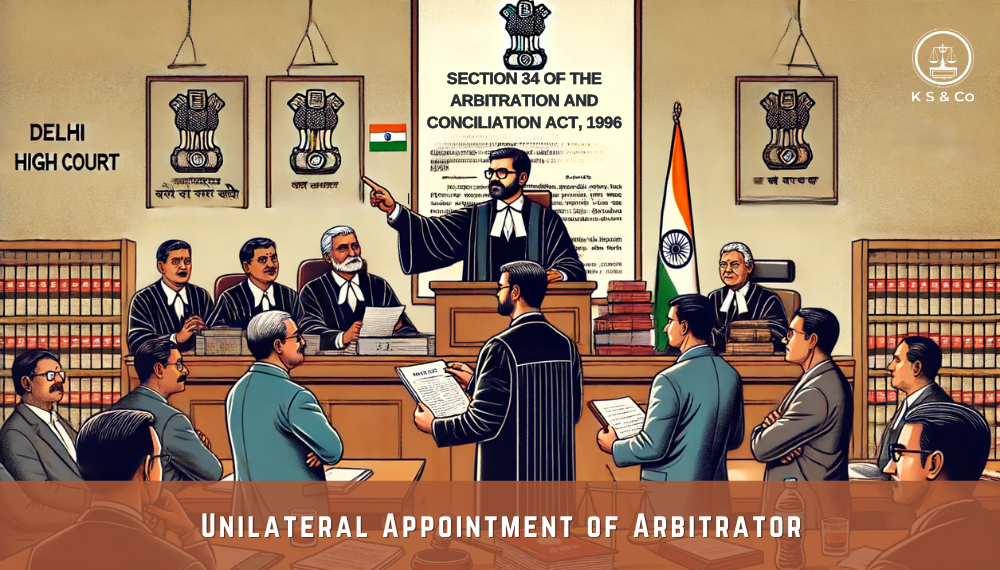
Union Of India v. M. V. Omni Projects (India) Ltd. – Delhi High Court
Citation: O.M.P. (Comm) 355 of 2023 – 8th May 2024
Ruling:
A petition under Section 34 of the Arbitration and Conciliation Act, 1996, was filed by the petitioner, for setting aside an award passed by the sole arbitrator on the ground that the arbitrator was appointed unilaterally by the Union of India. The Delhi High Court while allowing the petition, held that an award passed by an arbitrator who is appointed unilaterally is a nullity and is liable to be set aside.
Facts:
In 2015, the Union of India issued an open tender for construction work at Dwarka, New Delhi. The project included various components such as institutional and hostel blocks with a basement, auditorium, boundary wall, and comprehensive infrastructure systems. The respondent participated in the tender process and was awarded the contract. The work was to be completed within 15 months, however, due to disputes, the respondent invoked arbitration per the arbitration clause under the General Conditions of Contract ('GCC'). When the Union of India failed to appoint an arbitrator, the respondent filed a Section 11 petition before the Court, leading to an order to appoint an arbitrator. Consequently, the Addl. Director General appointed a Sole Arbitrator, who conducted the arbitration, and passed an award, partially favoring the respondent.
Issues:
Whether the appointment of the sole arbitrator was invalid under Section 12(5) of the Act or not? Whether the Addl. Director General is eligible to appoint the arbitrator or not?
Judgment and Reasoning:
The Court noted that it was a well-established principle that a unilateral appointment of an arbitrator was not legally permissible. It was observed that Section 12(5) of the Act invalidated any prior agreement if the arbitrator falls under any category listed in the Seventh Schedule, unless waived by an express written agreement after the disputes have arisen. It was further observed that, any arbitration proceeding heard by an arbitrator whose appointment is invalid under section 12(5) of the said act, is considered Void ab initio. The court concludes that the appointment of the Sole Arbitrator is invalid under Section 12(5) of the Arbitration and Conciliation Act, 1996. This provision declares that any person whose relationship with the parties or the counsel or the subject-matter of the dispute falls under the Seventh Schedule shall be ineligible to be appointed as an arbitrator.
Thus the appointment of the Sole Arbitrator is invalid under Section 12(5) of the Arbitration and Conciliation Act, 1996 because it was made by the Addl. Director General, Project Region, Delhi, who was not eligible to make such an appointment. The unilateral appointment of an arbitrator is not permissible under the law. As per the Arbitration and Conciliation (Amendment) Act, 2015, the arbitrator's ineligibility cannot be waived by the parties' participation in the arbitration. The court relied on the judgments Bharat Broadband Network Ltd. v. United Telecoms Ltd. (2019) and Telecommunication Consultants India Ltd. v. Shivaa Trading (2024) to support its conclusion. These judgments emphasize that unilateral appointments of arbitrators are not valid and that the arbitrator's ineligibility cannot be waived by the parties' participation in the arbitration.
K S&Co's Comments:
By declaring unilateral arbitrator appointments as legally impermissible under Section 12(5) of the Arbitration and Conciliation Act, 1996, the court reinforces the foundational principles of neutrality and transparency in dispute resolution. The judgment reconfirmed the basic principle that the arbitrator who is appointed to deal with the dispute should be neutral and both parties should give their consent for his appointment. The Court has re-established this rule that the arbitrator has to be fair and neutral and should be appointed with the consent of both the parties. This case underscores the judiciary's vital role in ensuring procedural fairness and upholding the rule of law in arbitration, thereby advancing the cause of justice in society.
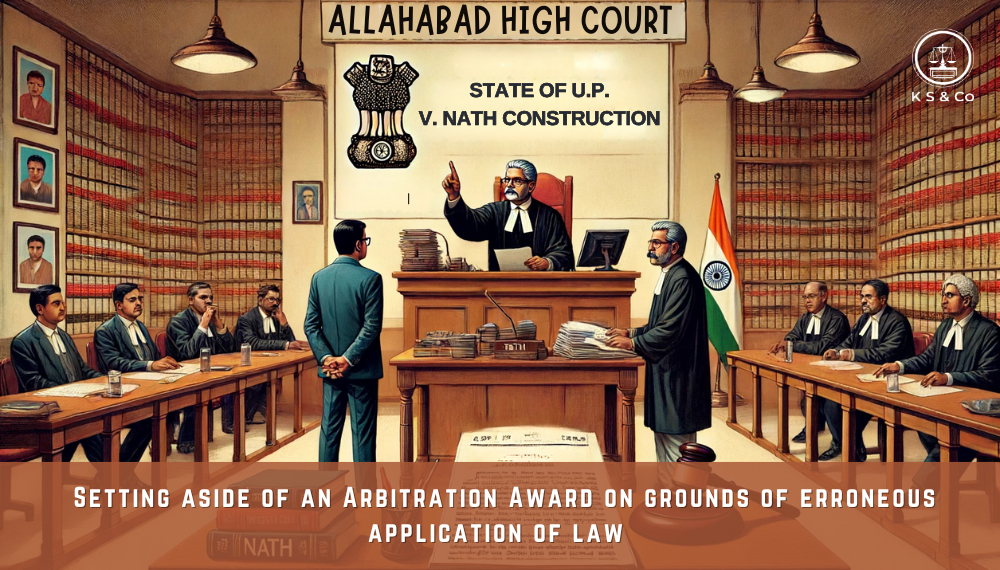
State of U.P. v. Nath Construction – Allahabad High Court
Citation: 2024 SCC OnLine All 1525 – 6th May 2024
Ruling:
The arbitration awards cannot be set aside on grounds of erroneous application of law or by reappreciation of evidence until and unless it suffers from patent illegality.
Issue:
Whether the arbitration award granted by the sole arbitrator can be set aside or not?
Facts:
The State, represented by the Executive Engineer, Madhya Ganga Canal Construction Division-15, Moradabad, issued a tender on 14-12-2010 to construct the Left Side Officer's Camp Office at Tubewell Colony, Moradabad. The claimant, Nath Constructions, was awarded the contract as their bid was the lowest. An agreement was signed between the State and Nath Constructions on 14-03-2011, wherein Nath Constructions was required to provide a security deposit and earnest money. The State alleges that Nath Constructions failed to complete the work within the stipulated time frame of 9 months, finishing it only on 15-10-2014 after extensions were granted. Disputes arose between the parties, leading to the appointment of a sole arbitrator as per the agreement terms. Nath Constructions filed a claim petition seeking payment along with interest. The sole arbitrator awarded Nath Constructions Rs.17,37,261/- along with interest, which the State challenged through an application under Section 34 of the Act. However, the application was rejected on 20-07-2022 by the Commercial Court in Moradabad.
Judgment and Reasoning:
While referring to Section 31(3) of the Act, the arbitrator has to state the reasons upon which the award is based, however, the said condition precedent would not apply in those contingency when the parties have agreed that no reasons are to be given or in the case of consented award. Aid has been taken to the judgment in the case of Reliance Infrastructure Ltd. Vs. State of Goa, while contending that the powers encapsulated under Section 34 have limited scope of interference and the same is not to be lightly interfered with, until and unless there is patent illegality under Section 34 or 37 of the Act. Carefully going through the objections/ reply of the appellant-objector, it reveals that the same is not specific and sans details. A bird-eye of the same reveals that the grounds assailing the award are general, not specific and untenable, Even before this court, neither any material has been placed on record, nor any argument has been advanced as to what is the factual basis and foundation, which renders the award to be suffering from patent illegality. The Court also mentioned the contours of the appellate proceeding under Section 37, since it is also limited to the scope and ambit of the challenge under Section 34 of the Act. To put it otherwise, the awards are not required to be set aside on the ground of erroneous application of law or by reappreciation of the evidence until and unless it suffers from patent illegality. The Court agreed with the argument that the arbitral award shall contain reasons as per the mandate of Section 31 (3) of the Act. However, according to the Court, the same depends upon the pleadings and the documents available on record.
The Court thus opined that the State failed to demonstrate any patent illegality warranting appellate intervention. Mere allegations without substantiation from pleadings and records were deemed insufficient to justify interference. Therefore, the Court dismissed the appeal for lacking merit.
K S&Co's Comments:
This case underscores the importance of specificity and detail in objections raised against arbitration awards. The State's failure to provide concrete evidence and factual basis for its allegations led to the dismissal of its appeal. The Court's emphasis on the limited scope of interference in appellate proceedings under Section 37 of the Act serves as a reminder that awards are not to be set aside lightly, unless they suffer from patent illegality. Additionally, the case highlights the distinction between technical experts and legally trained individuals, which can impact the scrutiny of arbitral awards. This case re-established the principle that the arbitration award should be treated as final and Court should not interfere in an award unless there is patent illegality.
: 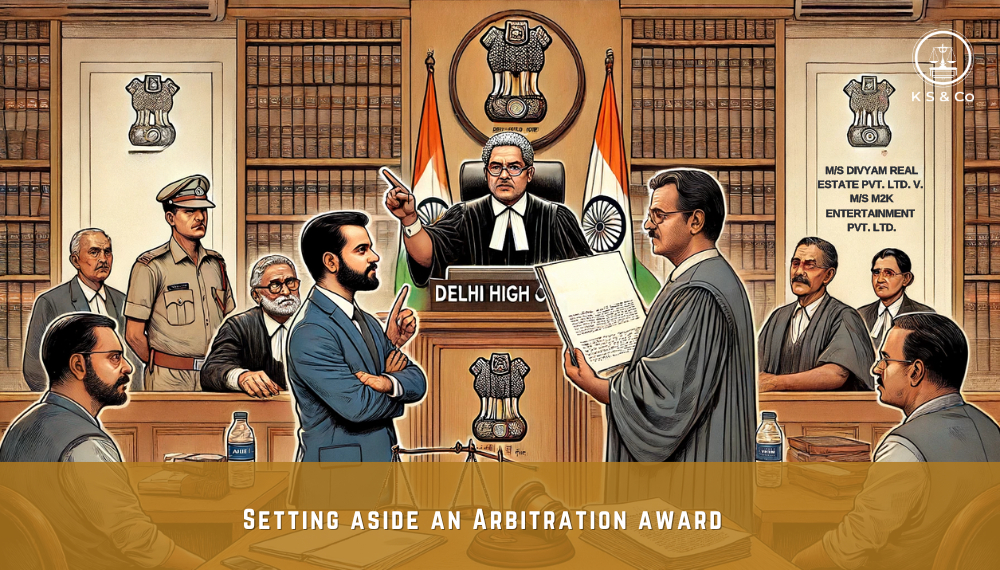
M/s Divyam Real Estate Pvt. Ltd. v. M/s M2K Entertainment Pvt. Ltd. – Delhi High Court; Decided on – 22.05.2024
Citation: O.M.P. (COMM) 162/2020 & I.A. 14331/2012, I.A. 10655/2022
Ruling:
Setting aside of arbitration awards on ground being that the learned Arbitrator did not proceed to on the basis of the evidence on record, that was available inter alia by way of the evidence tendered before him.
Facts:
The present petition, filed under Section 34 of the Arbitration and Conciliation Act 1996, seeks to set aside the arbitral award dated 07.03.2012. The dispute originated when the Petitioner breached a contract with the Respondent, with whom they had an MoU to construct 'R-3 Mall' in Ahmedabad, Gujarat. The Respondent alleged the Petitioner breached the MoU by contracting with a third party, leading to the Respondent's contract termination and subsequent arbitration claim.
The Arbitrator directed the Petitioner to pay Rs. 24,54,458/- with 12% annual interest, covering Rs. 4,54,458/- for advertisement expenses and Rs. 20,00,000/- for 'loss of profit.' The Petitioner challenged the award, citing a judgment requiring proof of lost profit opportunities. The Respondent maintained that the loss calculation was based on market evaluations, with sufficient evidence supporting the award.
Issue:
Whether the Learned Arbitrator was justified in issuing an award of Rs. 20,00,000.00 by way of loss of profit?
Judgment and Legal Reasoning:
The arbitrator cannot award any remittance under the pretext of offering supplementary reasons or bridging gaps in the rationale, especially when the award lacks findings on contentious issues. In the absence of such findings or if findings are made disregarding crucial evidence, it becomes valid grounds for nullifying the award itself. Granting the arbitrator the authority to provide additional reasons or fill in gaps in reasoning cannot be allowed to supersede the court's power. No amount of reasoning can rectify a defect in the absence of findings on contentious issues.
It was in the opinion of the Hon'ble High Court, the learned Arbitrator did not proceed even on the basis of the evidence on record, that was available inter alia by way of the evidence tendered before him. The Hon'ble High Court then held that it was persuaded to allow the present petition, holding that the award of Rs. 20 lacs to the respondent towards loss of profit was based on no evidence on record, and in fact, the learned Arbitrator has failed to even decide whether the respondent had incurred, or would have incurred, any loss of profit at all, and stated that the Arbitral Award dated 07.03.2012 is to be set aside.
K S&Co's Comment:
The above case deals with the issue that if the arbitrator has failed to give proper reason and in the absence of any evidence the arbitrator still passes award which is illegal then the Court can interfere and rectify the award in the interest of justice and to give Rule of Law correct meaning i.e. Court can set aside such award.
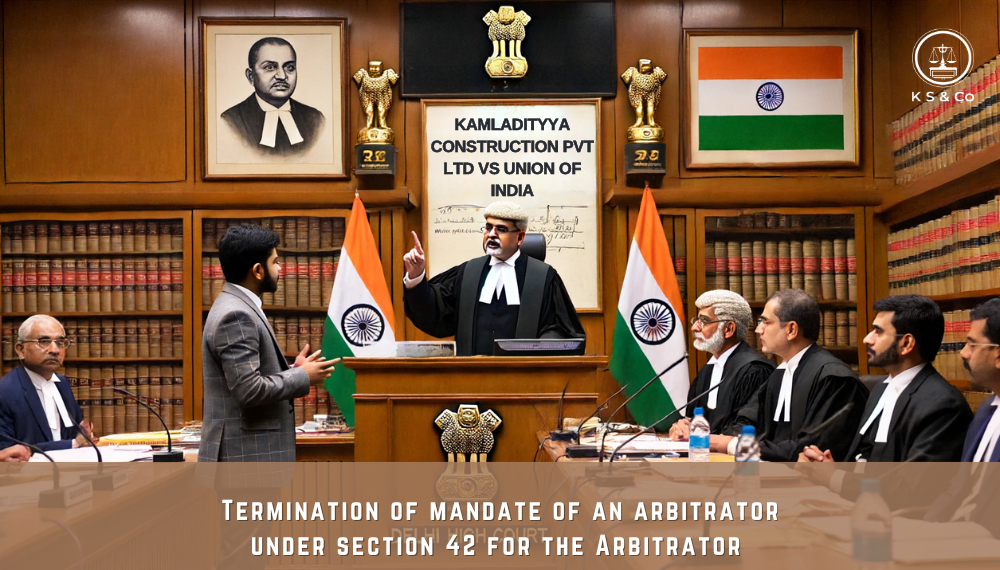
Kamladityya Construction Pvt Ltd Vs Union Of India – Delhi High Court
Decided on 27.02.2024
Citation: O.M.P. (T) (COMM.) 112/2023, I.A. 24177/2023, I.A. 24178/2023
Ruling:
Termination of mandate of an arbitrator who disclosed the award prematurely and revealed details about several claims during the hearing of the arbitral proceedings to the party.
Facts:
This petition, filed under Sections 14(1)(2) and 15(2) in conjunction with the Seventh Schedule of the Arbitration & Conciliation Act, 1996, seeks to terminate the mandate of Arbitrator Dr. S.K. Dhawan (Retired Chief Engineer, CPWD) and appointed a substitute. The Petitioner states that arguments concluded on 28.08.2023, with the Arbitrator's mandate expiring on 01.09.2023. On 12.09.2023, after the mandate had expired, Dr. Dhawan requested consent from the parties to extend the time for issuing the Award. However, the Petitioner contends that on the same day, the Arbitrator prematurely disclosed details of the Award to the Respondent. The Petitioner filed this petition in the Delhi High Court, alleging that this disclosure violated confidentiality provisions under Section 42A of the Act. Additionally, the Petitioner claimed that the Arbitrator was soliciting further arbitration appointments from the Respondent.
Issue:
Whether there is a mandate under section 42 for the Arbitrator to disclose the award prematurely? Whether the arbitrator's actions compromised the fairness and integrity of the arbitration process, particularly regarding confidentiality, procedural regularity, and arbitrator impartiality?
Judgment and Legal Reasoning:
The judgment in this case hinges on several key legal principles rooted in the Arbitration & Conciliation Act, 1996. Primarily, it addresses the breach of confidentiality as mandated by Section 42A of the Act, which requires that all arbitral proceedings and awards remain confidential unless disclosure is necessary for the implementation and enforcement of the award. The court found that the arbitrator violated this provision by prematurely revealing parts of the award to the respondent. As substantiated by a report from the Delhi International Arbitration Centre (DIAC) and an affidavit from the petitioner's counsel. Furthermore, the judgment noted that the arbitrator's mandate had expired, and his continued involvement in the matter without proper extension was unauthorized. Additionally, allegations that the arbitrator was soliciting future appointments from the respondent raised concerns about impartiality, although the respondent denied this. The combined effect of these actions led the court to conclude that the arbitrator's conduct compromised the fairness, impartiality, and confidentiality of the arbitration process. Consequently, the court terminated the arbitrator's mandate and appointed a new arbitrator to continue the proceedings from the final arguments stage.
K S & Co's Comments:
This is a case where there is misconduct of the arbitrator i.e. breach of confidentiality as provided in Sec. 42 of the Arbitration Act and also arbitrator cannot act in his self-interest against principle of neutrality then the Court is justified to set aside certain award which is based on illegality of procedure by the Arbitrator as confidentiality is one of the pillars for parties to choose arbitration over Court litigation.
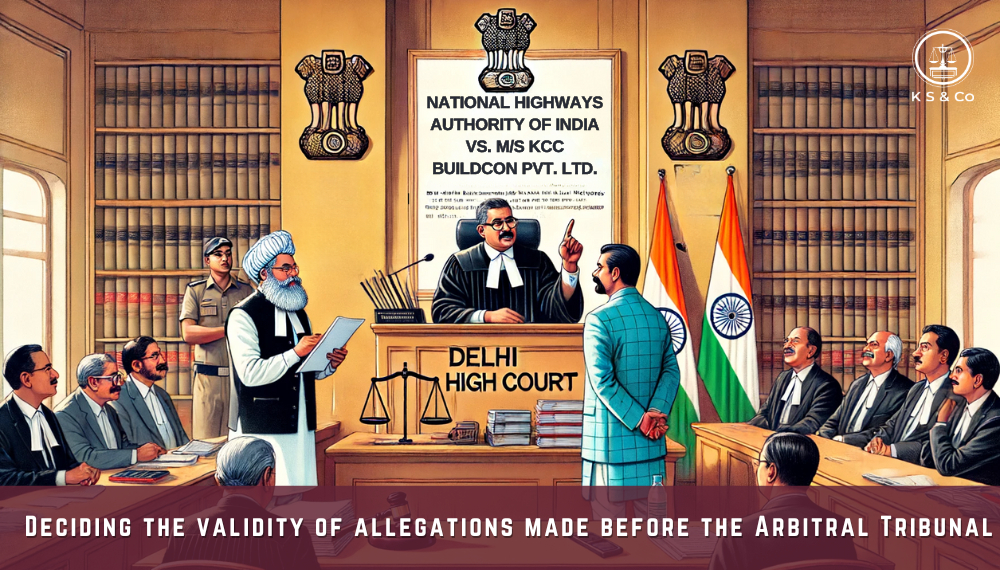
National Highways Authority Of India Vs. M/S Kcc Buildcon Pvt. Ltd. – Delhi High Court.
Citation: O.M.P.(MISC.) (COMM.) 327/2024 Decided on 29th April 2024
Ruling:
Making allegations against the Arbitral Tribunal without any basis is contrary to the letter and spirit of the arbitral process.
Facts:
In this case, a dispute emerged between the NHAI and M/S Kcc Buildcon Pvt. Ltd. ("Respondent") over an Engineering, Procurement, and Construction agreement (EPC) initiated between them. Consequently, an Arbitral Tribunal was established on 23rd December 2021, with a mutually agreed six-month extension. However, delays in the arbitration process arose due to the Respondent's requests for amendments to the written statement and statement of claims in September 2022. As the proceedings advanced to the Respondent's cross-examination phase, the respondent opted to nominate a new arbitrator, citing concerns about the previous tribunal's impartiality. Additionally, the respondent initiated a petition under Section 11 of the Arbitration and Conciliation Act, 1996 in the Delhi High Court (the Court), seeking the appointment of a new arbitrator and a fresh constitution of the tribunal. In response, the NHAI sought an extension of the Arbitral Tribunal's mandate through an application under Section 29A of the Arbitration Act.
Issue:
The primary issue revolves around the validity of the allegations made by the Respondent against the Arbitral Tribunal. The Court had to determine whether these allegations had any substantial basis and were in line with the principles governing the arbitral process. Another crucial issue pertained to the responsibility for the delays in the arbitration proceedings. The Court needed to ascertain whether the delays, particularly in the presentation of evidence, were primarily attributable to actions taken by the Respondent or other factors.
Judgment and Legal Reasoning:
The judgment in the case of National Highways Authority Of India vs M/S Kcc Buildcon Pvt. Ltd. revolves around the petitioner, NHAI's, request for an extension of the mandate of the Arbitral Tribunal under Section 29A of the Arbitration and Conciliation Act, 1996. The disputes stemmed from an Engineering, Procurement, and Construction (EPC) agreement between the parties. Despite the initial constitution of the Arbitral Tribunal and subsequent extensions, delays occurred due to actions by the respondent, including requests for amendments to pleadings and submission of extensive new evidence. The respondent alleged bias and sought the nomination of a new arbitrator. The Judge rejected the allegations of the Respondent, emphasizing the importance of maintaining the integrity of the arbitral process. The court extended the mandate of the Arbitral Tribunal highlighting the need to ensure fairness and adherence to due process while dismissing attempts to alter the composition of the tribunal based on unfounded claims. This judgment underscores broader principles of fairness, due process, and integrity in arbitration proceedings.
K S & Co's comments:
This judgment serves as a strong reminder to uphold the principles of fairness and impartiality in arbitration proceedings. It highlights the necessity of supporting allegations with evidence and avoiding delaying tactics that can compromise the arbitration process. As members of the legal community, we must maintain the integrity of arbitration and help ensure the faster resolution of disputes. By extending the tribunal's mandate until December 31, 2024, the court reinforced its dedication to creating a fair and efficient dispute resolution environment. Additionally, it stressed the importance of preserving the integrity of arbitration and warned against using extension requests to change the tribunal's composition.
The content of this article is intended to provide a general guide to the subject matter. Specialist advice should be sought about your specific circumstances.
We operate a free-to-view policy, asking only that you register in order to read all of our content. Please login or register to view the rest of this article.


